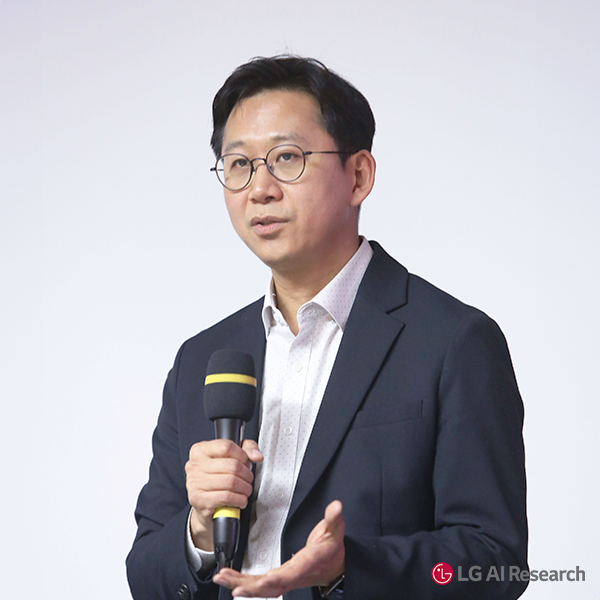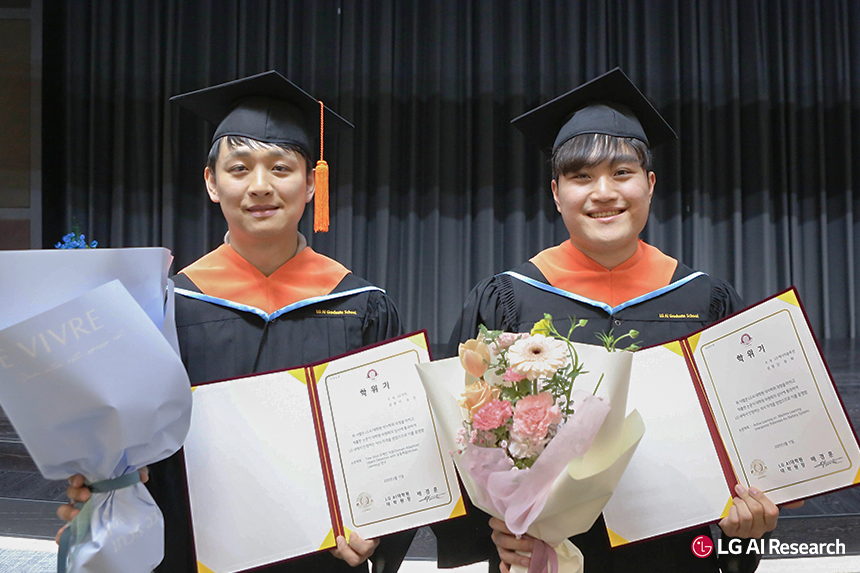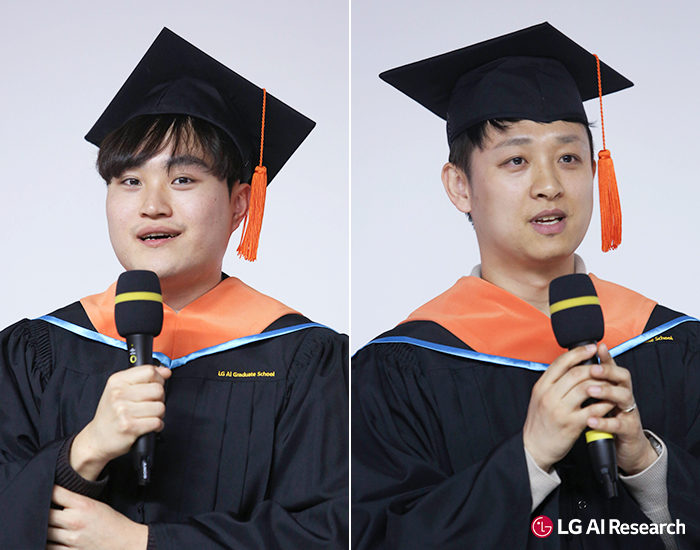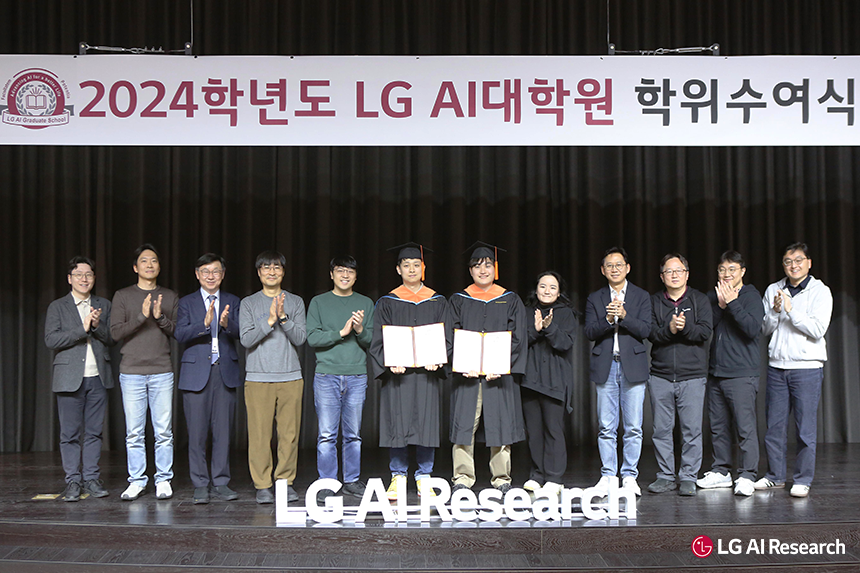LG AI Graduate School to Develop LG's Future Leaders with AI
The LG AI Graduate School, an in-house graduate school established to strengthen AI competitiveness across various business fields within the LG Group, has successfully concluded its 2024 courses. With this achievement, the LG AI Graduate School has once again produced master’s degree recipients this year, following last year, further proving the successful operation of the group’s AI talent development system.
On February 11, LG AI Research held a ceremony at the Vision Hall in LG Science Park, Magok, to commemorate the latest group of master’s graduates.
Combining Expertise and Practical Experience: LG AI Graduate School
The LG AI Graduate School, which officially opened in March 2022, trains AI experts through projects based on real-world challenges faced by affiliates, while also providing theoretical education and data at a level comparable to master's and doctoral programs at external institutions. The degree recipients undergo the same level of education and evaluation as they would in master’s programs at these institutions, from selecting research topics to writing theses and taking final examinations. The examination committee consists of 3 judges, including esteemed professors from external AI graduate schools. The committee rigorously reviews and verifies the quality of students’ theses, objectively demonstrating their research capabilities.

Image 1. Kyunghoon Bae, President of LG AI Research, giving a congratulatory message
Professors and mentors from the Graduate School of AI, who have been closely guiding students throughout their research activities, attended the ceremony to support and congratulate the graduates. Jungyun Seo, AI Talent Development Supervisor at LG AI Research, congratulated the graduates, saying, “The fundamental quality for learning is curiosity. By consistently investigating how to apply AI skills to practical work, you can generate a constant stream of new ideas.” and wished them success in their future endeavors. Kyunghoon Bae, president of LG AI Research, sent a message of congratulations and encouragement, stating, “By applying AI technology to real-world industry and data, the impact can be maximized. The insights gained from graduate studies will guide us towards future advancements.”

Image 2. LG Electronics' Seungjoon Lee(left) and LG Energy Solution's Donghwa Shin receiving their master’s degrees
Master's degree certificates were then awarded to Donghwa Shin of LG Energy Solution and Seungjoon Lee of LG Electronics. Donghwa Shin’s research focused on optimizing MLIP (Machine Learning Interatomic Potential), an AI model that describes the interaction between atoms, for the battery domain. Seungjoon Lee developed a framework for creating an efficient object detection model by integrating few-shot domain adaptive object detection with active learning. Donghwa Shin expressed confidence that he could apply the knowledge gained from this program to his practical work. Seungjoon Lee reflected on his master's program, acknowledging personal areas for growth while emphasizing the significant expansion of AI knowledge.
Interview with Donghwa Shin and Seungjoon

Image 2. LG Energy Solution's Donghwa Shin and LG Electronics' Seungjoon Lee
Donghwa Shin, Cathode Material Manager in the Cathode Material Advanced Team at LG Energy Solution
Q. Why did you apply to the LG AI Graduate School?
I wanted to study and research AI, so I was looking for relevant educational opportunities. The Graduate School of AI seemed like a great fit, so I applied.
Q. Tell us a little bit about your work in the field.
My work involves applying AI technologies, such as MLIP, to design cathode battery materials and validate them through experiments.
Q. What did your research at the LG AI Graduate School focus on?
I modified MLIP, an AI model that describes interactions between atoms, to better suit the battery domain and built a pre-trained model. I then conducted uncertainty estimation and applied active learning to develop a model with high MD calculation accuracy.
Q. What have you gained from the LG AI Graduate School master’s program?
In the field, I rarely studied theory and focused on using models I had received. Through the Graduate School of AI’s master’s program, I was able to dive deep into the theory and structure of SOTA (state-of-the-art) models. This experience provided me with valuable knowledge and new ideas that I can apply in my work.
Q. How do you feel about graduating from the LG AI Graduate School, and what are your goals for the future?
Looking back on these nine months—which felt both long and short for a master’s program—I realize how much I’ve learned. There were tough moments, but I knew an opportunity like this wouldn’t come again. Overall, it was one of the busiest and most fulfilling periods of my career.
Right now, I’m preparing to submit a research paper to a relevant journal based on my master’s work, and I hope that goes well. Moving forward, I plan to focus on turning AI-designed materials into real-world industry products.
Seungjoon Lee, Senior Research Engineer in the Intelligent Solution Team, Production Technology Center at LG Electronics
Q. Why did you apply to the LG AI Graduate School?
I was already preparing to pursue a master's degree in AI through an external graduate school. Then, I was fortunate enough to come across an opportunity to apply to the LG AI Graduate School. I knew I couldn’t miss it, so I applied right away.
Q. Tell us a little bit about your work in the field.
I’m currently responsible for program development and AI model development for vision inspection. My role includes developing the technical components required for vision inspection, from selecting cameras and lenses to designing the UI/UX of inspection programs.
Q. What did your research at the LG AI Graduate School focus on?
I researched a framework for developing an efficient object detection model by integrating few-shot domain adaptive object detection with active learning. Conventional object detection models used in the field require large amounts of data, making their application to new domains costly and time-consuming. To address this, I conducted research on how to overcome the data distribution gap between the source domain and a new domain by using only a small amount of data from the new domain, ultimately improving the model's generalization performance.
Q. What have you gained from the LG AI Graduate School master’s program?
I had never written a paper before, so going through the entire process—from proposal to defense—was an invaluable experience. The reference papers on vision that I can now apply in my work, along with the guidance I received from my advisor, have been great assets. Additionally, the time I spent with fellow researchers over the past nine months has been truly unforgettable.
Q. How do you feel about graduating from the LG AI Graduate School, and what are your goals for the future?
To be honest, I was really worried about whether I would even be able to graduate. Looking back, I realize that the program helped me identify some of my weaknesses. I found research to be more challenging than I expected, and since this was my first time writing a paper, I struggled with articulating my findings clearly. The thought of defending my paper also added to my anxieties about graduating.
Thankfully, everything went well in the end, and I’m proud to say that everything I experienced during the program will be valuable in my future work. Moving forward, I want to apply what I’ve learned over the past nine months to solving real-world challenges in vision testing with AI. I also aim to create an environment where developers can efficiently and conveniently leverage AI models in their work.
Developing a Core Workforce for the AI-Powered Future of Business

Image 4. LG AI Graduate School 2024 commencement ceremony
The LG AI Graduate School focuses on providing project-oriented education using data from real-world business sites, guided by faculty members who are outstanding experts from LG AI Research. This education aims to produce AI experts who can immediately apply their knowledge to the group’s various business sectors. Through the operation of an in-house graduate program that will offer both master’s and doctoral degrees in the future, the LG Group will be able to build a more systematic and in-depth AI talent development system. This is expected to significantly strengthen the group’s competitiveness in the AI industry. With this institutional support, the LG AI Graduate School is poised to play a key role in cultivating the group’s AI experts, innovating AI-based customer experiences, and creating differentiated value.



